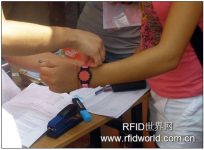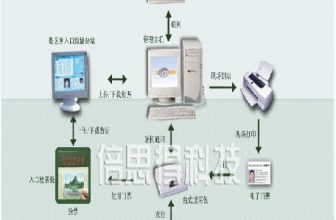
Israel’s Coca-Cola Village combines RFID and Facebook to expand the circle of friends
[ad_1]
This summer, a total of 6,500 Israeli teenagers participated in 10 activities in Coca-Cola Village. The organizers used RFID technology to allow visitors to share their experience with family and friends through the social networking site Facebook. The digital marketing team E-dologic developed and installed this system for Coca-Cola, Israel, and organized and managed activities through Facebook.
Every year, E-dologic will try to adopt new technologies and hold some innovative marketing activities for Coca-Cola products, said company founder Enon Landenberg. This year, the company set its sights on the Coca-Cola Village-Israel’s Coca-Cola Company has been sponsoring this event for the past two years. The Coca-Cola Village activities last for three days and two nights. During this period, teenagers can play in an alcohol-free environment with a large number of Coca-Cola products. Entertainment programs include swimming, music, one-man burlesque, spa and football.
The Coca-Cola Village event is welcomed by more and more young people. However, Landenberg hopes to promote this event more widely by combining RFID and Facebook, so that users can share their play details with family and friends. Each visitor is provided with a wristband with a passive RFID tag. The wristband can be read at multiple entertainment points and employees with handheld devices. The read information or pictures can be automatically posted on the user’s Facebook page. After the visit, the returned wristband can be put back into use.
Coca-Cola Village organized a total of 10 events in a hotel and park in the Netanya area of Israel. Each event lasted for three days and two nights for a total of 6 weeks. E-dologic created a Coca-Cola Village page on Facebook, inviting site members aged 15-18 to participate. Members only need to meet three requirements to sign up for this activity: get 10 Coca-Cola bottle cap codes (that is, consume 10 Coca-Cola bottles), sign the consent form of parents and gather 8 friends to form a small team. The participation fee for the event is US$50 per person. E-dologic makes reservations for hotel beds (650) for each event on Facebook, and all beds for each event are booked within 1.5 seconds. According to Landenberg, a total of 25,000 people submitted applications on Facebook. In the end, a total of 6,500 people participated in the full 6-week event, and a total of 1,500 wristbands were put into use.
At the event site, when the teenagers checked in at the hotel, each was assigned a plastic wristband, decorated with a round shape similar to a Coca-Cola bottle cap. The bottle cap is embedded with a 125KHZ passive RFID tag conforming to ISO 11784 and 11785 standards, containing a unique ID code. The tag ID code has been entered into the software system of E-dologic’s server and corresponds to the wearer’s Facebook account.

Wristband with 125KHZ passive RFID tag
The staff installed 40 wooden boxes of “Like Machines” on the venue. The boxes were about 18 inches long and painted with a thumbs up gesture. Like Machines is designed by Israeli RFID provider Ofer Leshem Ltd. When the user shows the wristband 35 cm away from the box, an RFID reader in the box reads the ID code of the user’s tag. The reader then sends the ID code along with the date and time to the server via the cellular connection. The E-dologic software corresponds the ID code of the wristband to the user’s Facebook page, and publishes relevant information about the entertainment item on the user’s web page.

Visitors just wave their wristbands in front of Like Machines to match their Facebook accounts
For example, in the SPA area, if the user taps the wristband on Like Machine, the system will post an update message on the user’s webpage, such as “I am enjoying the best massage of my life in Coca-Cola Village”. There are also some readers installed at the entrance of the park to identify when users arrive at the venue and when they enter the restaurant to eat. Other readers install multiple entertainment venues.
A few days before the event, Landenberg said that this system has been installed, and E-dologic is considering whether it can use this system to provide other services. The company thought of a service: posting user photos on Facebook’s personal page. At the event site, there are three employees carrying handheld RFID readers-don’t wear them on their shirts, or hang them under their necks like a digital wireless camera-if the visitor wants to take a photo and post the photo on the web page, he wears a wristband Tap the reader, the employee then takes a photo of him or her, and the software receives the ID code and photo of the tag and publishes it on the user’s webpage. Similarly, if a group of users take group photos (up to 15 people), Landenberg said, the reader gets 15 ID codes, the system calls up 15 corresponding Facebook URLs, and the photos are posted on the URLs of all photo members.
This service stimulates users to frequently adopt Like Machines, Landenberg said. Those users who read the most wristbands in a day will be rewarded and will be invited to join the performers on stage that night. “On average, each visitor reads 25 times. He said that Facebook’s Coca-Cola Village site received 1.5 million clicks and responses.
Moreover, E-dologic can also understand the on-site situation through the software, such as the number of people on site at any time, because users need to show their wristbands when entering the park every day; it can also understand how many people are in the restaurant during meal times, and it is estimated that how many people will come. So as to arrange meals accordingly.
According to Landenberg, the company also came up with other applications for the system. For example, the company plans to build a large Coca-Cola bottle that can hold two people next year. A reader is installed in the bottle to read the wristband tags of two people. The software then corresponds the ID codes of the two to their Facebook accounts and lists them as friends on Facebook.
This system has helped Israel’s Coca-Cola increase its visibility, Landenberg said. Now Landenberg and other event organizers around the world are trying similar RFID wristband systems. The Israeli Coca-Cola Village and its RFID Facebook function have caused a great public effect in Israel. “Basically all teenagers are aware of this activity,” Landenberg said.
[ad_2]




